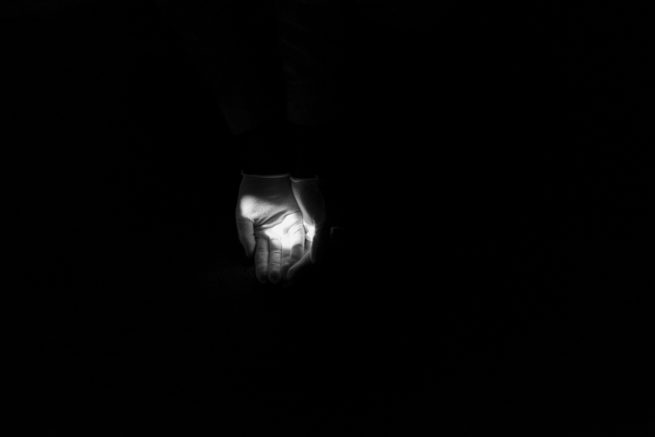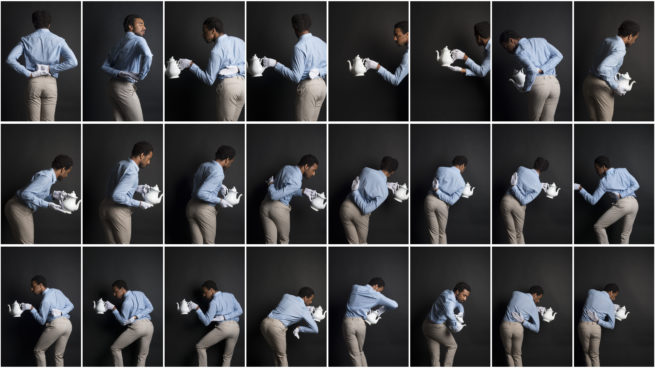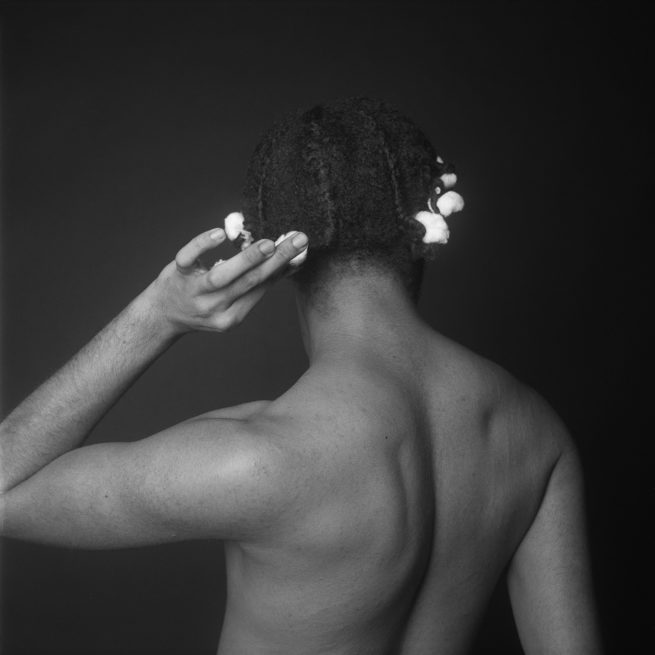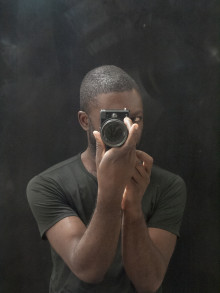Announcing the winner of this year’s Ryan R. Gibbs Photography Contest, judged by Paul Mpagi Sepuya:
Jonathan Jackson will receive $400, and their work The House Servants Directory will be published as the cover art for our Winter issue, launching December 14th. We are thrilled to share this artist’s work with you all.
What our Judge, Paul Mpagi Sepuya has to say about the series:
“I have been thinking a lot over the past year about photography and sequence, and how it relates to performance but also the foundation of the medium. How the singular photograph in fact part of a continuum that unfolds frame after frame. This unfolding takes place in Jonathan Jackson’s project, in reenacting the graceful yet laborious gestures of their ancestor Robert Roberts and catalogue of the servant’s tools, detailed in Roberts’ book “The House Servants Directory” (1827) which coincides with the world’s first photographs. In Jackson’s work I enter into the time of the medium’s emergence through the unseen black labor, as precise and exacting as any science.”
Read an excerpt from Jonathan’s artist statement here:
“The images included within this application are a summarization of a body of work being built around a book called The House Servants Directory, that was written 1827 by my fifth great grandfather Robert Roberts. This text was written in Waltham, Massachusetts while Roberts was employed by U.S. diplomat, Christopher Gore. My work seeks to question the action and intimacy of servitude, explore the day to day lives of Black Americans during the early to mid-nineteenth century, and meditate on predetermined fate built by family. I am interested in addressing broad conceptual questions around Roberts life: How did Roberts find himself in Massachusetts? Was he born free, or did he escape to the northeast? How does Roberts work relate to and inform my work and life? What were the main influences on Roberts to write The House Servants Directory? How can we utilize a familial archive to shape our personal identity? Through engaging with history, my work has also shifted from being completely lens based on incorporating multiple practices, including drawing, printmaking, sculpture, dance, moving images, and video.”
Their full statement will be published in our Winter issue. Below, find a selection from their winning work. The rest of the collection will also be published in December.



Congratulations also to this year’s incredible finalists who made this contest so compelling:
- Runner up – Izabela Jurcewicz – So Far Yet So Close (will also be published in the Art section of Dec issue!)
- James Knowlton – There is No Blue Without Yellow and Orange
- Shterna Goldbloom – Frum Feygeles in Flight
- Camila Franco Ribeiro Gomide – The Things We Bring With Us
- Austin Miller – Dark Matter
About our contest:
For the Ryan R Gibbs Photography Contest, New Delta Review seeks a series of 5-11 photographs to be featured in our journal’s Winter issue. Together, the photographs should tell a story, or be centered on a unified theme of the artist’s choosing. This contest goes hand-in-hand with our flash fiction contest, which seeks a full narrative in 1500 words or less.
For the Ryan R. Gibbs Photography Contest, New Delta Review seeks a series of 5-11 photographs to be featured in Issue 9.1 Together, the photographs should tell a story, or be centered on a unified theme of the artist’s choosing. This contest goes hand-in-hand with our flash fiction contest, which seeks a full narrative in 1,000 words or less.
Check out our most recent winning series, Gazelle Naghshbandi’s All Are Immigrants, here.
Judge: Paul Mpagi Sepuya
Prize: $400 and publication in Issue 9.1 of NDR
Deadline: November 7, 2018
Entry Fee: $5, free after October 29th
Submit here.
Additional Submission Guidelines:
- All entries must be the original, previously unpublished work of the entrant.
- Each entry must be accompanied by an entry fee.
- Each entrant can submit a maximum of two separate entries.
- All work must be submitted through Submittable.
- Send only high quality med-res JPG files.
- Please submit 5-11 photographs as JPG or as a single zip file.
- Submissions will first be looked at by the staff of New Delta Review, who will select the finalists. These works will be passed on to our judge.
- Family, friends and previous students of the judge are ineligible for participation. Current students and faculty of LSU are also ineligible.
About this year’s judge:

Paul Mpagi Sepuya (b. 1982, San Bernardino, CA) lives and work in Los Angeles, where he received an MFA in photography at UCLA in 2016. From 2000-2014 Sepuya resided in New York City, receiving a BFA from New York University’s Tisch School of the Arts in 2004 and participating in Artist-in-Residence programs at the Lower Manhattan Cultural Council, the Center for Photography at Woodstock, The Studio Museum in Harlem and Fire Island Artist Residency.
Sepuya’s work is in the permanent collections of the Museum of Modern Art, the Whitney Museum of American Art, the Guggenheim Museum, the Studio Museum in Harlem, the International Center for Photography, the Cleveland Museum of Art, the Milwaukee Art Museum and the Carnegie Museum, among others. Recent solo exhibitions include “Dark Room” at team (bungalow), Los Angeles and “Figures, Grounds and Studies” at Yancey Richardson Gallery, New York City, and group shows at the New Museum, Callicoon Fine Arts and Sikkema Jenkins & Co., in New York City. He will be participating in “Being : New Photography 2018” at the Museum of Modern Art, New York City, opening this coming Spring.
Sepuya’s work has been reviewed in ARTFORUM, The New Yorker, Art Review, Frieze, Hyperallegic and The Nation, and he is a recipient of the 2017 Rema Hort Mann Foundation’s grant for emerging Los Angeles artists.
Site: www.paulsepuya.com
About Ryan R. Gibbs: This award is in honor of Ryan R. Gibbs (1981-2012), a gifted editor for New Delta Review, an incredible writer of fiction and screenplays, a talented photographer, and, above all, a dear friend. New Delta Review is honored to host this annual award, which was made possible by a generous endowment from his parents, in his name.